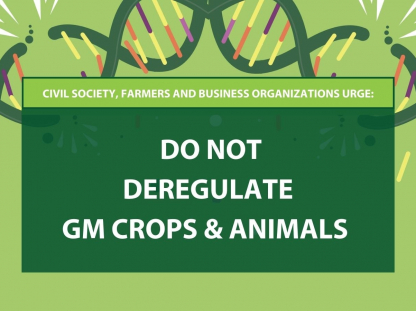Deregulating gene editing?
The relaxation of European GMO regulation is imminent, which is bad news for sustainability, and also for consumer rights.
On 29 April 2021, the European Commission published a new report calling for a review of the current regulations on genetically modified (GMO) and gene edited organisms. The report implies substantial relaxation, the result of which could be that crops modified through gene editing will no longer be considered GMOs, and will henceforth be outside the scope of the GMO regulation. This might cease the obligation of labelling and traceability, significantly reducing the risk assessment and food safety standards which apply to these products.
Even before the report was officially published, 162 NGOs, agricultural and retail businesses signed an open letter to the President of the European Commission, requesting that gene editing continue to be regulated under the existing GMO regulation. Given that the application of this technology and its release into the wider environment and food chain can have far-reaching impacts which are not yet fully understood, regulations must remain in place. The open letter was also signed by six Hungarian organizations.
Are genetic modification and gene editing the same?
While genetic modification and gene editing are quite different from a technological point of view, when it comes to food-safety and environment protection, as well as cultivation technology, the distinction is by no means as clear.
Although current techniques of gene editing are indeed far more advanced than previous transgenic technologies, the anticipated role of gene edited organisms in adapting to climate change, and indeed the risks of their release into the environment, are very similar to that of traditional GMOs. It is true that gene editing provides more targeted modifications and does not introduce foreign DNA into the genetically engineered organism, and can indeed create mutations that could have occurred through previously accepted breeding methods or natural processes. However, this does not mean that gene editing itself is a natural process, or that the changes it can introduce at either the genomic or population level are negligible enough to justify the abolition of control and risk analysis. This is because gene editing can also give rise to numerous untargeted mutations, RNA variants and secondary metabolites, the results and consequences of which (potential toxicity, allergy) must be examined individually for each genetically edited organism.
Within a new legislative framework, the previous authorization procedure, which provided adequate regulatory control, may now fundamentally change.
The current regulation of gene editing
Within the European Union, under Regulation (EC) No 1829/2003, all food products and animal feed containing more than 0.9% GMOs or their derivatives must currently be labelled as such, a permit is required to cultivate them, and the registration of varieties is subject to a biological and environmental risk assessment.
In July 2018, the European Court of Justice ruled that in addition to “classical GMOs”, i.e. genetic modification involving the transfer of genes from a different species, organisms produced by in-vitro mutagenesis (i.e. by cisgenesis or gene editing, without the incorporation of foreign DNA) are also considered genetically modified organisms, thus their authorization and marketing are subject to the same restrictions.
Gene editing and the GMO lobby
It is important to note that non-human and pharmaceutical genetic modification and gene editing are not just scientific procedure, they are also powerful tools in biotechnology, a field which is having a profound impact on the agricultural, food and chemical industries, and is developing extremely rapidly. Moreover, genetically engineered organisms, like GMO crops, are also products with a potential market value. Thanks to regulation, the work of green organizations, and strong consumer rejection, the adoption of GMO crops in Europe has so far been limited. However, in the case of gene edited crops, this may still change, as agro-biotech companies have long been working to relax regulations.
Might they succeed with gene edited organisms, where they failed before with GMOs? Unfortunately, judging by the European Commission's report, that now appears to be the case.
Gene editing, climate change and sustainable agriculture
According to the new report, which proposes deregulation, the cultivation of gene edited crops would help meet sustainability goals. This is contradicted by scientific findings and the fact that a significant proportion (six varieties) of the 16 gene edited variety candidates expected to be marketed and cultivated in the next five years is herbicide resistant, similarly to popular GMO varieties. The resistance gene comes with associated products, determining the type of herbicide that can be used effectively by the grower, but the link to sustainability is not justified, and it does not ensure that the 50% herbicide reduction target of the Farm to Fork strategy will be achieved.
Although two cultivar candidates do carry biotic stress tolerance (resistance to pathogens and pests) no candidates for abiotic stress tolerance (e.g. tolerance of drought, heat, or saline) can be found among those gene edited varieties at a near-market phase of development. On this basis, there is no reason to expect that gene edited plants could play a significant role in adapting to climate change in the near future.
Gene edited plants under widespread cultivation
So far, only one gene edited agricultural crop is cultivated in America: a herbicide-tolerant canola, SU Canola. The European Commission's database records a total of 426 gene edited plants, the vast majority of which (409) are still in the research and development phase, and are far from ready to appear on the market.
Given all this, the question naturally arises: What could justify the deregulation of gene edited plants?
The current European legislation does not prohibit the cultivation of either traditional or new-generation GMOs. However, the upholding of the current risk analysis, traceability and labelling standards are crucial. Only these can ensure that producers and consumers have the freedom of choice, and that the food production chain is transparent.
Gene editing and organic farming
The widespread use of gene editing in agriculture would primarily promote the further spread of input-intensive, industrial agricultural practices and patented technologies. Diverse farming systems adapted to local conditions and the spread of organic farming would be severely affected by this process, in addition to a further reduction in the diversity of crops grown.
A new and more relaxed regulatory framework which removes the obligation to label gene edited products would not only make consumer choice impossible, undermining confidence in European food, but would also pose serious problems for the organic farming sector. As the new organic regulation, which enters into force on 1 January 2022, makes clear, that in organic farming interventions below cell level, transcending the boundaries of natural processes is not allowed. Without transparency and proper traceability, the organic sector would remain unprotected and unable to meet either legal requirements or consumer expectations.
Although the introduction and goals of the European Green Deal, Farm to Fork and Biodiversity strategies (the reduction of pesticide use by 50%, an increase in the share of organic farm land to 25% until 2030) are still being debated in Hungary, they could represent a significant step forward in terms of sustainability. At the same time, it is worrying that under the scope of these strategies the gene-technology industry is trying to authorize new genetic engineering processes and bring them to market without adequate traceability obligations.
Namely, there is currently no adequate scientific, ethical or legal reason to abolish the risk assessment and traceability of gene edited plants in Europe.
Authors: Fruzsina Szira, Judit Fehér - Research Institute of Organic Agriculture in Hungary
Photo: unsplash.com


.png)





